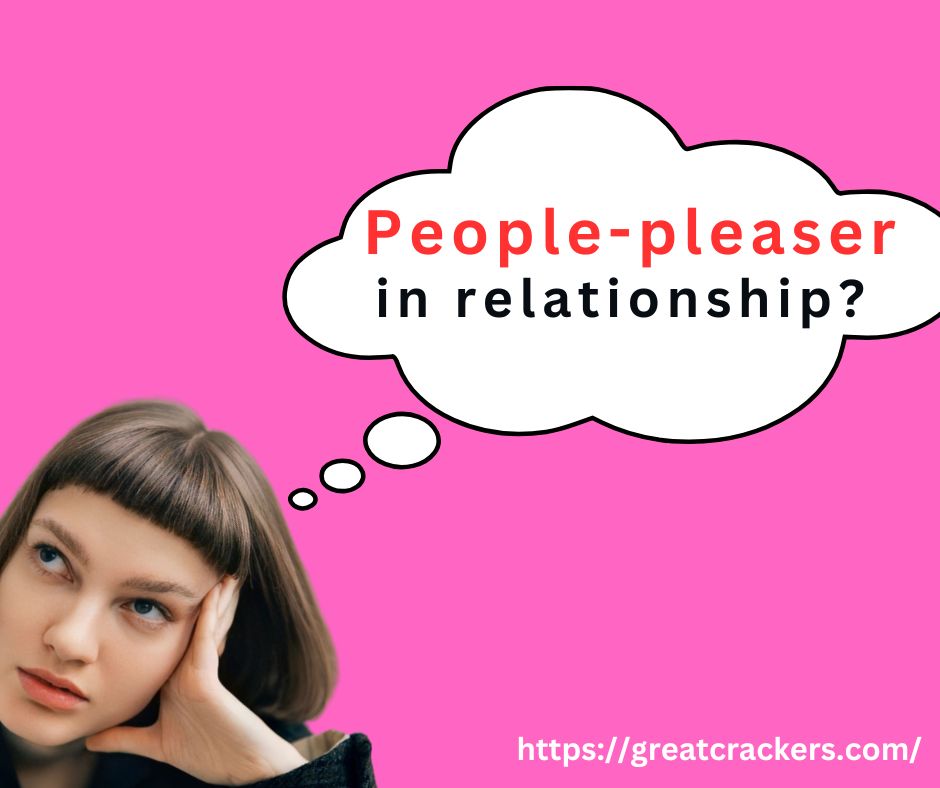People-Pleasers in Relationships: How to Navigate the Challenges and Find a Healthy Balance
What do you think about people-pleasers in relationships?
As someone who’s in a relationship, you’ll agree that problems may arise sometimes. And one problem is when you and your partner don’t communicate well.
Often that can cause misunderstanding and give room for arguments. Another issue is when you both don’t trust each other. And sadly, this can make one party jealous or feel the need to control the other.
But sometimes, people-pleasers in relationships don’t feel good enough for their partner, making them worried that their partner will leave them. That’s what you may call insecurity in a relationship.
That said, one’s past traumas or emotional problems can also affect how one acts in a relationship.
For example, a couple may have different values. And one may want to do things alone, and the other wants collaboration. If you find yourself in such a case, you and your partner might have difficulty reaching a consensus.
In this post, you’ll learn:
- Everything you need to know about People-Pleasers in Relationships, and
- How to Find a Healthy Balance as a People-Pleaser in Your Relationship
The Challenges of Being a People-Pleaser in Relationships
You already know that people-pleasers find it easy to make others happy. Often at the expense of their needs and desires.
But while it may be a positive trait on some occasions, being a people-pleaser can result in significant relationship challenges.
That said, here are some of the challenges you may face in your relationships as a people-pleaser:
-
Difficulty saying “no”
One would have difficulty saying “no” to their partner’s requests or demands as a people-pleaser. Even when one is overwhelmed or uncomfortable.
And unfortunately, that can lead to resentment and burnout, which is one of the dangers of being a people-pleaser.
-
Lack of boundaries
Again, people-pleasers may struggle to set healthy boundaries in their relationships. And that can make them feel being taken advantage of or disrespected in a relationship.
-
Neglecting one’s own needs
In every relationship, it’s good for both parties to always take into perspective each other’s needs. But people-pleasers often prioritize their partner’s needs over their own in an unhealthy manner.
Consequently, that can lead to neglecting their physical, emotional, and mental health.
-
Codependency
One of the behavioral predispositions of people-pleasers is they’re codependent. So you say becoming overly dependent on their partner’s approval and seeking validation is a challenge for a people-pleaser in a relationship.
Regrettably, that gives room for an unhealthy dynamic in the relationship.
-
Feeling unappreciated
Despite their efforts to please their partner, people-pleasers may feel unappreciated and undervalued, leading to resentment and dissatisfaction.
That’s why a people-pleaser needs to recognize these challenges. And then work on developing healthy communication skills, setting boundaries, and prioritizing their needs and desires (in their relationships).
How People-Pleasing Behavior Can Impact Different Types of Relationships
While romantic relationships will always come to mind, people-pleasing behavior can impact different types of relationships in different ways. They include:
-
Romantic Relationships
As said earlier, people-pleasing behavior can cause problems in romantic relationships. And often, the outcome is resentment and burnout. Yet, making a relationship suffer.
That’s because, as a people-pleaser, one may agree to do things one doesn’t want to do. Or one may sacrifice one’s needs for one’s partner’s happiness.
-
Friendships
Friendships are often most of the relationships classified as platonic.
In this type of relationship, a people-pleaser may be afraid to say “no” to their friends’ requests. Or he(she) may avoid conflict to keep the peace.
Interestingly, that can lead to feeling like you’re being used or may cause you to feel unhappy in the friendship.
-
Family Relationships
You’ll agree that a relationship with family members can be priceless, especially when they’re healthy.
But people-pleasing behavior in family relationships can cause you to feel like you need to keep the peace and avoid conflict.
As a result, you may see yourself prioritizing your family members’ needs over yours. And that can lead to neglecting your own mental and emotional health.
-
Work Relationships
Like most adults, you most likely spend a large part of your day working with colleagues at your workplaces.
But people-pleasers may struggle with setting boundaries and may say “yes” to every request. Either from their boss or coworkers.
And as such, that may make one (a people-pleaser) overwhelmed and stressed. But not only that. It may cause one to struggle to meet one’s own work goals.
Signs That You Might Be a People-Pleaser in Your Relationship
“It can be tricky to recognize when you’re in the people-pleasing pattern in your relationship,” says Bradley S. (2022).
But below are some of the profound signs to look out for that can tell you might be a people-pleaser in your relationship:
- Constantly saying “yes” to requests or demands
- Avoiding conflicts and disagreements
- Putting your partner’s needs and wants before your own
- Apologizing excessively or taking the blame for things that aren’t your fault
How to Find a Healthy Balance as a People-Pleaser in Your Relationship
How to deal with people-pleasers?
According to Raypole C. (2019), “If you want to break the pattern of people-pleasing, recognizing how these behaviors show up in your life is a good first step.”
Yes, I couldn’t agree more. Because, to solve a problem, one must first discover its origin.
That said, as a people-pleaser, it can be challenging to find a healthy balance in your relationship. And also between pleasing your partner and taking care of your own needs.
However, here are some tips to help you find that balance:
-
Practice saying “no”
First, it’s important to recognize when you’re feeling overwhelmed or uncomfortable. But it will require more courage from you to practice saying, “no” to your partner’s requests or demands.
Remember that it’s okay to prioritize your own needs.
-
Set healthy boundaries
Learn to start facing your fears: setting boundaries in your relationship.
That can help you maintain a healthy balance.
When you communicate well with your partner about what you’re comfortable with and those you’re not, you both can work together to find a win-win compromise.
-
Prioritize self-care
Make time for activities that bring you joy and help you recharge. These pleasurable activities include exercise, reading, or spending time with friends.
By prioritizing your physical, emotional, and mental health, you can help yourself feel more balanced and fulfilled in your relationship.
-
Communicate openly
Also, you must be open and honest with your partner about your needs and feelings. In other words, you’re to share your thoughts and concerns with them in a respectful and non-judgmental way.
That way, you can work together to find solutions and build a stronger relationship.
Final Thought
Relationships are not always a bed of roses. Especially in those people-pleasing tendencies are traceable.
Yet, people in a relationship must recognize these problems early and work together to fix them. So they can have a happy relationship.
Meanwhile, sometimes people have power struggles in their relationships, which means they want to be in charge or have control. But by applying the tips in this post, you should be able to manage unhealthy tendencies constructively. Without wrecking your relationships.
You may want to get my book People-pleasing and Anxiety.
Source:
Bradley S. (2022). Signs you’re people-pleasing in your relationship – and how to quit it. https://metro.co.uk/2022/08/17/signs-youre-people-pleasing-in-your-relationship-and-how-to-quit-it-17198217/
Raypole C. (2019). How to Stop People-Pleasing (and Still Be Nice). https://www.healthline.com/health/people-pleaser#how-it-affects-you



![Realize Your Effective and Ineffective Study Habits [100% Explained]](https://greatcrackers.com/wp-content/uploads/2022/04/realize-your-effective-and-ineffective-study-habits.jpg)



